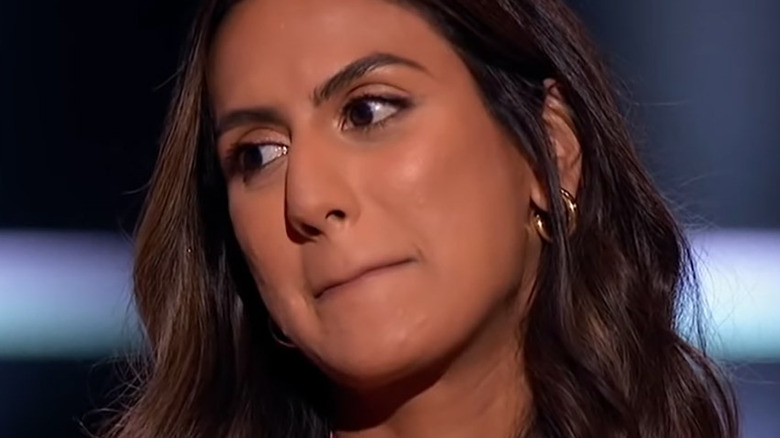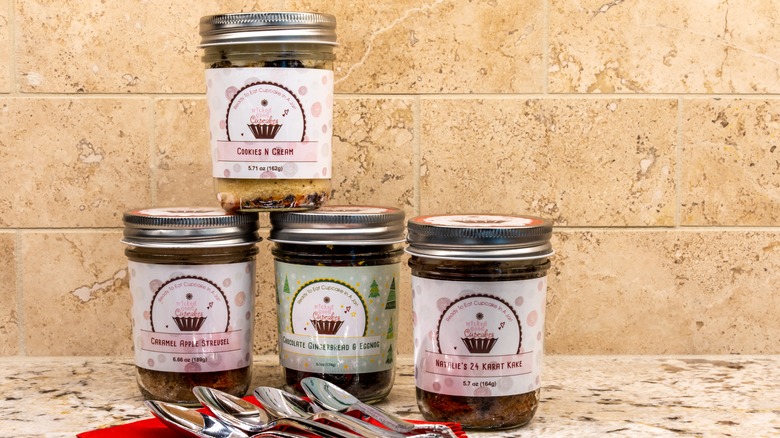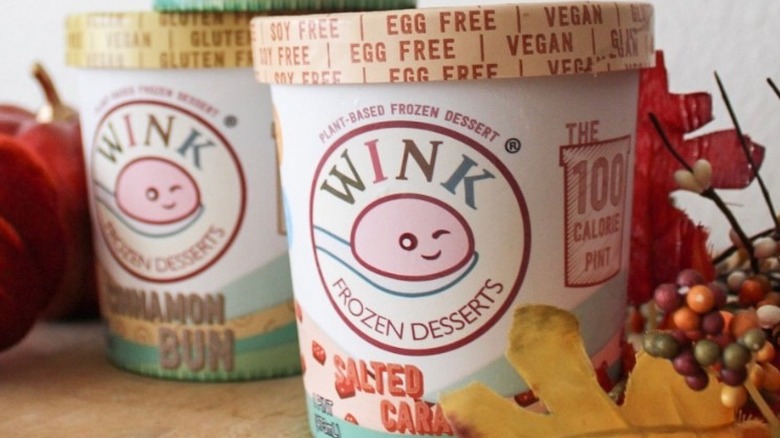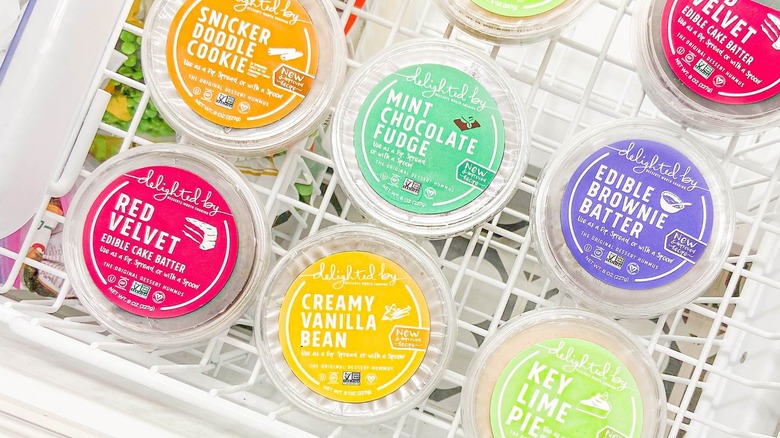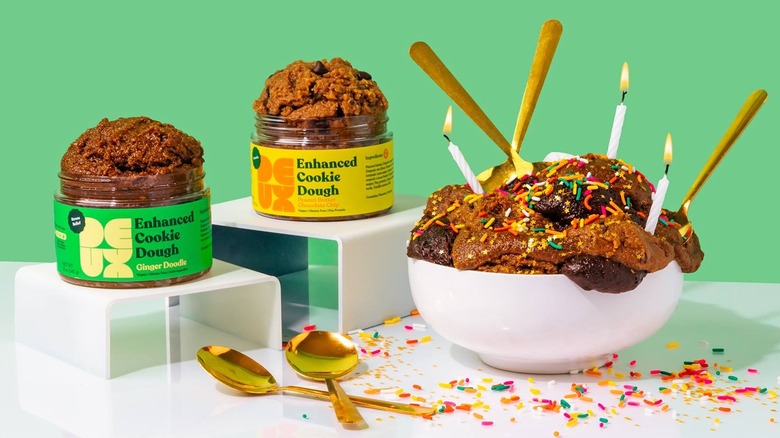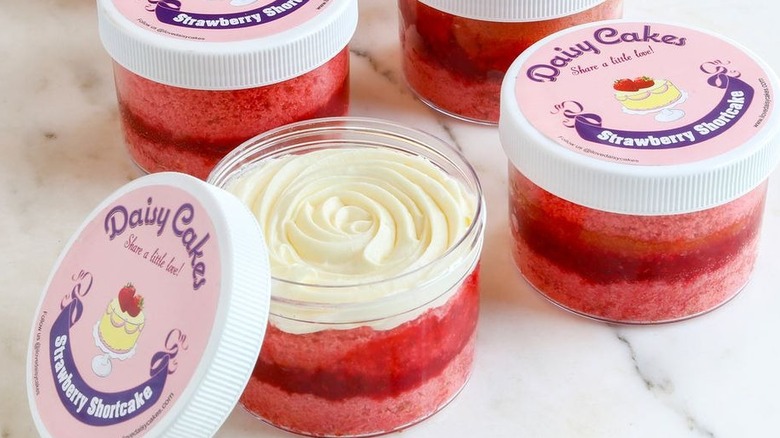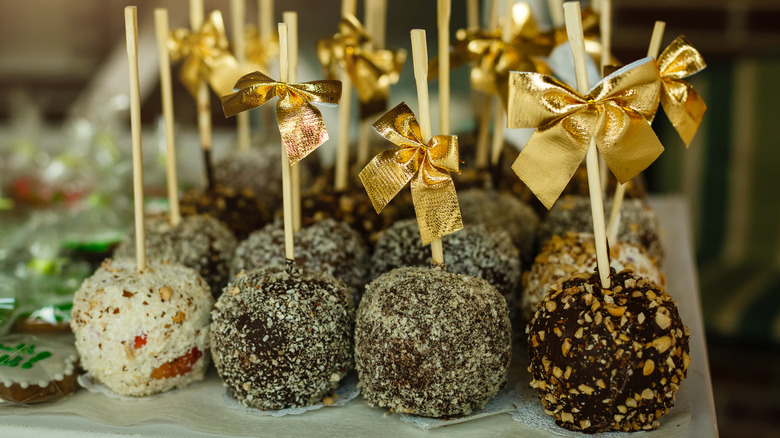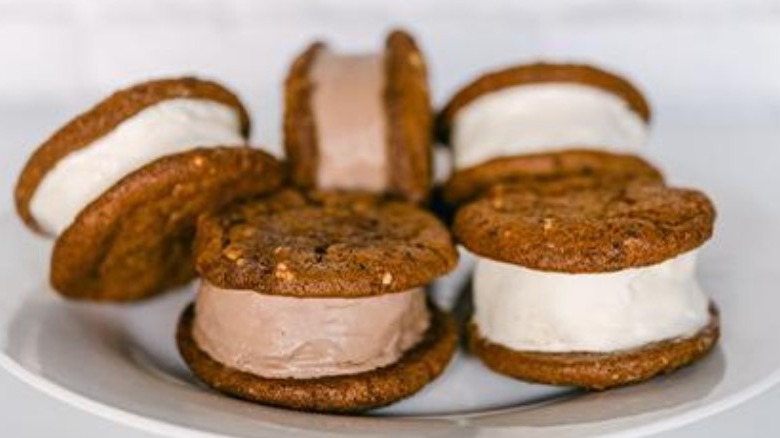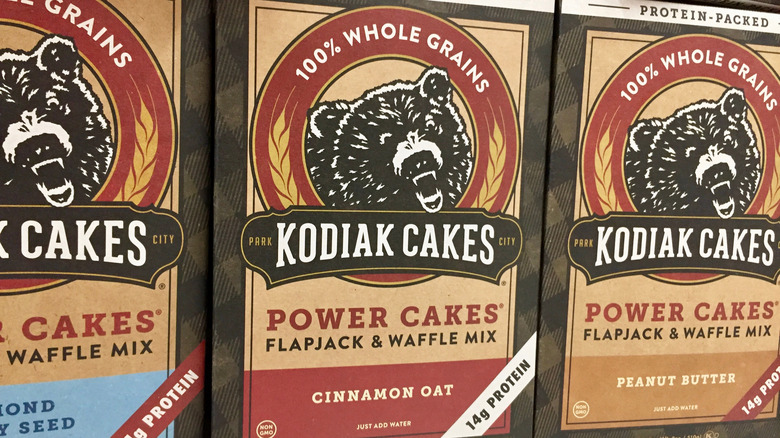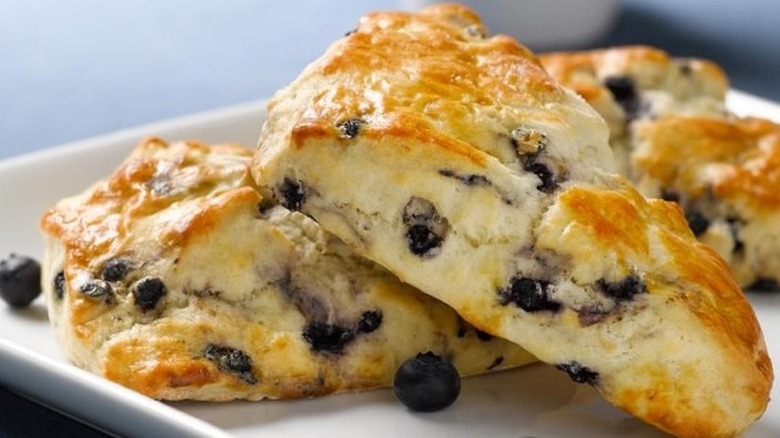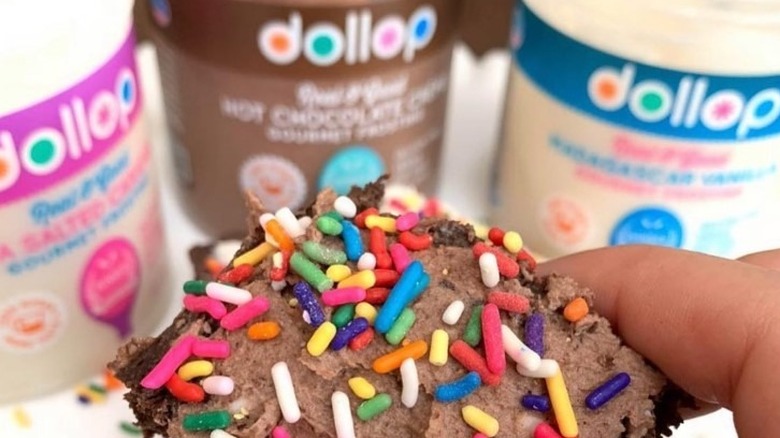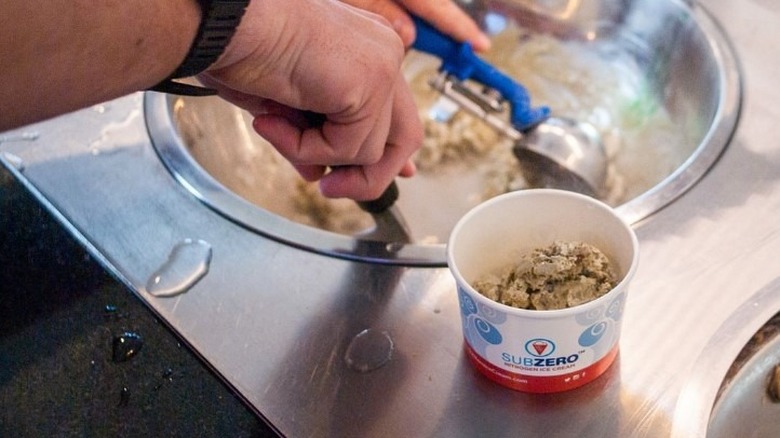The Best And Worst Dessert Pitches That Made It To Shark Tank
The Sharks from ABC's "Shark Tank" love to get their teeth into a great investment deal. They also love food products and pitches, especially if they get to taste them. There are plenty of entrepreneurs who've faced the Sharks with some interesting desserts, from plant-based ice cream cookie sandwiches to cupcakes in a jar. There's even been a dessert made from a savory Middle-Eastern dip. The variety of options isn't so surprising since consumers across the country love an after-dinner course or a sweet treat at any time.
While some desserts have tasted so good that they've inspired the Sharks to bite, other pitches have failed the taste and turnover tests. From investment opportunities with the potential for profits to missing out on a sweet deal or turning down a sour proposition, the Sharks have had to assess each pitch as it was presented. If you've got a sweet tooth, check out some successes that are still available either in stores or online. Here are the best and worst dessert pitches that made it to "Shark Tank."
Wicked Good Cupcakes
Wicked Good Cupcakes is one of the most successful businesses to appear on "Shark Tank" and is part of the show's legacy. The Season 4 pitch transported a mother-daughter duo making cupcakes in jars into the owners of a multi-million dollar brand (via ABC on YouTube). Tasting a cupcake, Shark Lori Greiner loved the taste, while Kevin O'Leary said his sample was "one damn good jar of cake." Mark Cuban wolfed his down declaring it was so good that it was already finished. Robert Herjavec, admitting he wasn't into desserts found the cake a little sweet, whereas Daymond John jokingly thought he might end up eating too many (via Shark Tank Global on YouTube).
The investment deal was struck for $75,000 and involved a $1 return per jar until the amount was paid back, as well as an ongoing 45 cents per jar. The idea to ship the cupcakes to customers was also introduced. Each jar has the equivalent of two cupcakes and plenty of flavors such as chocolate sprinkle, red velvet, and salted caramel. There's also a flourless chocolate raspberry cupcake and gluten-free varieties. The cupcake company has since rapidly grown, amassing $40 million in sales after the show. Following this success, Hickory Farms bought them out for millions of dollars (via Shark Tank Blog).
Verdict: A great pitch that saw O'Leary striking a sweet deal as sales soared among cupcake fans across the nation.
Wink Frozen Desserts
Wink Frozen Desserts is a healthier alternative to ice cream that was showcased in Season 7 of "Shark Tank." With a presentation board stating it was "ice cream's worst nightmare," the dessert is made from pea protein and contains only 100 calories per pint. Fat-free, sugar-free, and vegan, this guilt-free dessert could have been a winner. The owners asked the Sharks for $300,000 in exchange for 15% equity (via ABC on YouTube).
However, it wasn't meant to be, mainly because the Sharks just didn't like the taste, as Shark Tank Blog noted. The dessert came in six flavors: vanilla bean, choco-mint, cake batter, cinnamon bun, iced latte, and cocoa dough. Shark O'Leary quipped that the sample was "taste-free," and neither Greiner nor Herjavec liked the stevia and monk fruit-sweetened dessert. Even lactose-intolerant Cuban couldn't get excited about the flavor. Furthermore, Barbara Corcoran didn't like the lack of profits.
Today, the frozen dessert has melted into nothing, and the creators have since moved on to new ventures. With a huge explosion of plant-based foods in recent years, there's definitely been a market for dairy-free alternatives to ice cream. However, if the Sharks don't personally like a product, they rarely invest.
Verdict: The pitch lost momentum with the Sharks because of the product's lack of taste and no offers to keep this frozen dessert afloat.
Delighted By
Delighted By was definitely up there in terms of quirky desserts that appeared on the hit ABC show, "Shark Tank." Pitched in Season 9, the Sharks were surprised with a dessert that tasted like cookie dough made from ... wait for it ... hummus (via Shark Tank Recap). While it may sound a little strange, a review from Shark Tank Success called the taste "sublime," explaining it could be eaten straight from the tub or used as a dip. The chickpea sweet only boasted 5 grams of sugar per pot.
Four flavors (vanilla bean, brownie batter, snickerdoodle cookie, and choc-o-mint) are featured in a promotional clip on the Delighted By Hummus YouTube channel. Meanwhile, the Facebook page showcases other flavors, which include red velvet, mint chocolate fudge, and key lime pie. Unfortunately, a lack of belief in the valuation and faith in the entrepreneurs to be able to lead resulted in the three investors dropping out.
While O'Leary made an offer, it was Cuban who shook hands on the asking investment of $600,000. In exchange, he secured 25% equity rather than the 12% pitched. However, the deal never came to fruition. Insignia SEO reported in 2020 that sales were soon up to $5 million. Today, however, there's no real online activity regarding the brand, and the founder's focus is directed toward Kakao, a ceremonial drinking chocolate.
Verdict: A valiant pitch effort that didn't create sustainable success into 2023.
Deux
Deux is an Enhanced Cookie Dough introduced to the Sharks in Season 13. The dessert is a healthier cookie dough made with quality vegan and gluten-free ingredients packed with vitamins and supplements to boost your immune system. After all the Sharks dropped out, Herjavec came back in for the deal. However, he quickly snatched back his offer after company founder Sabrina Ladha tried to renegotiate a request for $300,000 for 10% equity. While the entrepreneur went on to find success, her time with the investors was a failure (via ABC on YouTube).
In May 2022, Ladha was interviewed on the TODAY show about the functional dessert and how she set up the company during the pandemic. As of February 2023, flavors include cookies & cream, space brownie, Mari's matcha with chocolate chips and coconut flakes, peanut butter cup, chocolate chip, brownie batter, and birthday cake.
Verdict: The pitch was a disaster, and in the case of negotiations with one Shark, a double whammy of rejection. However, the dessert appears to be gaining fans after being stocked at Sprouts Farmers Market, select Whole Foods, and Target.
Daisy Cakes
Daisy Cakes creates cakes with farm-fresh produce including eggs that come from the coop, hand-churned butter, and garden-grown veggies. Made in the South with love, the handmade cakes are shipped frozen to customers and come in classic varieties such as red velvet, strawberry and white chocolate, carrot, award-winning lemon, coconut, and chocolate. There's also a birthday cake, Minikins (cakes in a jar), and seasonal cakes on a monthly basis.
Appearing on "Shark Tank" in Season 2, Shark Corcoran invested in a $50,000 deal for 25% of the company. The other Sharks didn't think the small business could easily scale up so they bowed out. While the investor was concerned about the size of the business, the deal has certainly paid off. Over a decade later, the reports on turnover for 2023 are at $4 million (via Shark Tank Blog). That's a lot of cake! Entrepreneur Kim Nelson put her heart into baking and won the pitch, taking her brand from small town to big business.
Verdict: A perfect example of a pitch that succeeded due to personality and produce. The size of a business and clarity about returns on investment don't always lead the way.
Sweet Ballz
Sweet Ballz delivers cake balls covered in frosting to customers' doors, offering a range of delicious flavors. The varieties sold online as of 2023 are red velvet, salted caramel, cookies & cream, lemon, birthday cake, and chocolate. The idea for the sweet bites was pitched on "Shark Tank" in Season 5 and quickly attracted investment opportunities. In fact, all of the Sharks were interested in the pitch, and having an order from 7-11 was definitely a bonus. However, legal wrangles that ensued between the two owners between the time the show was filmed and aired derailed the full potential of the brand's future (via Shark Tank Success).
Shark Tank Blog notes that the company didn't quite take off as expected. Still, Sharks Corcoran and Cuban secured a joint deal of 25% equity for $250,000, though the asking stake in the business for this amount was 10%. With this level of interest and success on the horizon, we're glad to report that the company did survive. In 2022, the turnover was apparently $5 million. Nonetheless, it's probably fair to say that while these bitesize cakes are hardly a failure, they're not the household name that they may have become.
Verdict: While the pitch was appetizing, the beef between the entrepreneurs and the issues that followed were not so sweet, which may have delayed or soured some success.
Coconut Girl
Coconut Girl sells dairy-free paleo cookie sandwiches with a coconut cream filling and made with almond butter for a chewy texture. Natural sweetness is added to the grab-and-go frozen coconut milk dessert with dates, honey, and maple syrup. The three flavor varieties are Aloha chocolate, Hang Loose vanilla, and Beach Bum maple.
During her pitch on Season 11 of "Shark Tank," Filipino-born entrepreneur Frankie Yamsuan revealed a contract with Whole Foods and a big natural food distributor that would take the product to Hawaii. Seeking $180,000 in exchange for 18% equity, the desserts were pitched as a product that wouldn't retail directly to consumers (via ABC on YouTube).
Cuban went in for the kill against the other Sharks, securing 20% equity before they'd had a chance to counter. With his love of plant-based food, it was no surprise to anyone. O'Leary pushed him down from 25%, and while Greiner expressed interest she didn't get a chance to stake her claim before it was all over. Pinoy Money Talk reports that despite establishing not long before the pandemic, the brand has survived.
Verdict: A fresh, clean-food pitch saw one Shark offer an ultimatum, threatening to take the deal out of the room if it wasn't accepted then and there. While the businesswoman won't know what the other Sharks would have offered, she got the investment and investor she was hoping for.
Puppy Cake
Puppy Cake appeals to dog owners who love their four-legged friends enough to bake them a canine-friendly dessert. The business features mixes for cookies, wheat-free cakes, and ice cream fit for dogs and made with human-grade ingredients. The company sells birthday cake kits with bone-shaped pans and candles, available in six flavors with frosting. Peanut butter is the most popular option, and there's also pumpkin, red velvet, banana, carob, and birthday cake with Pupfetti sprinkles. Launched in 2007, the idea was pitched on Season 3 of "Shark Tank" in 2012 with a request of $50,000 for a 25% stake in the company.
Leaving with no deal didn't deter Kelly Costello, the woman behind the brand, from launching a mix-at-home ice cream for dogs. The creamy treat comes in a variety of flavors, including maple bacon. Despite mentioning she was already selling the dog dessert internationally, Shark O'Leary questioned if there was even a market for people cooking cakes for their dogs. Greiner piped in that her mother-in-law bakes cookies for her dog, assuring that these people exist (via CNBC Prime on YouTube). Although she lost out on a deal, the founder told Billion Success that she was thankful for the criticism from the Sharks as it has since helped her succeed.
Verdict: While the pitch didn't give rise to an investment, the company has continued to grow and provide animal desserts to celebrate great doggy times.
Kodiak Cakes
Kodiak Cakes is a flapjack and waffle mix business that appeared on "Shark Tank" in Season 5. The mixes are made from whole wheat, oats, and honey with no extra sugars or fats. Using sustainable ingredients, the family-run Utah company also makes crackers, cookies, granola bars, and protein cups that are nourishing for breakfast, as a snack, or for dessert. The founders are also passionate about wildlife and donate some of their profits to supporting bear conservation efforts.
Seeking a $500,000 investment in exchange for 10% of their business, the entrepreneurial duo failed to get a deal. Shark O'Leary suggested that the only equity he'd be willing to accept was 50% but wasn't going to make this suggestion as he knew it would be rejected. On the back of this, Herjavec jumped in with a 35% equity proposal. Corcoran offered $250,000 for 20% on the basis that another offer was made, with this rising to 25% with the same offer from O'Leary once again (via CNBC Prime on YouTube). By 2020, the business was worth $200 million, and in 2022, Deseret News reported that actor Zac Efron had become a shareholder and Chief Brand Officer of the company.
Verdict: When the entrepreneurs politely turned down the Sharks, they also turned their backs on an investment of half a million dollars. However, they knew that their business was going to be worth more, and the Sharks definitely missed out on this opportunity.
Jones Scones
Jones Scones makes natural cream scones as pitched on Season 4 of "Shark Tank." The entrepreneur behind the brand set out on a quest to bring classic British cream tea scones to the U.S. after spending time in England. For a good while before and following the show, the scones were sold at Whole Foods (via Shark Tank Products). However, fast-forward to 2023, and the business seems to have disappeared.
Gazette Review reports that the founder sought $100,000 for 25% equity. The Sharks sampled either chocolate or blueberry scones, and Greiner commented she wasn't "passionate" about the taste. John and Herjavec had questions about the purpose of the investment and questioned whether the product could really impact the market. O'Leary wasn't convinced either and noted that there was nothing stopping anyone else from making scones. He also felt that with this in mind, the profitability and success of the business potential didn't bode well. The businessman left the room before Cuban had officially turned him down.
Verdict: The scones were easier to digest than some of the tricky investment questions. While the Sharks liked the man behind the idea, they were less sold on where the business was at and where it could go.
Dollop Gourmet
Dollop Gourmet is a vegan frosting that is low in sugar, soy-free, and gluten-free. In other words, it's far healthier than regular frosting. The flavors on offer include cream cheese cashmere, hot chocolate crème, Madagascar vanilla, and sea salted caramel. The product was shared with the "Shark Tank" investors on Season 7. While Herjavec was definitely not a frosting fan, sweet-toothed Cuban admitted he was a "frosting freak." Pitching on the show wasn't the first TV appearance for entrepreneur and founder Heather Saffer. She'd already courted success winning Season 4 of Food Network's "Cupcake Wars" (via Shark Tank Blog).
Seeking $75,000 in exchange for a 20% stake, Corcoran agreed on the investment for 25% although it ultimately didn't go through. Meanwhile, "Queen of QVC" Greiner declared that she couldn't see the dessert product on the sales channel even though it has appeared on it. Since then, the founder has written two frosting cookbooks (via Digital Food Lab).
In 2019, the company was acquired by Canadian icing specialist business Mimac, and Saffer stated she would still be involved on an ad hoc basis (via Starter Story). The original website shows no update since announcements about pandemic orders and everything is marked as sold out. Perhaps the frosting brand is on hold, awaiting a future relaunch.
Verdict: The Sharks loved the frosting and offers were made. While no investment came of it, the company's success was whipped up after it was aired on the hit show.
Sub Zero Ice Cream
Sub Zero Ice Cream offers a myriad of customized desserts created by a founder with a science degree and his entrepreneurial wife. The concept demonstrated in Season 4 of "Shark Tank" involves making ice cream using liquid nitrogen. The dessert is made at a main store, and the company is rolling out franchises and corporate shops. Shark Greiner tried the chocolate with chocolate cookie dough flavor while O'Leary tasted coconut with berries. The investors loved the creamy texture and the overall experience.
However, the investment deals were frozen when the $300,000 ask for 12% of the company wasn't scooped up by the Sharks. From not wanting to get involved with the ice cream market, to feeling that the pair were better off continuing alone, the investors seemed more interested in eating the dessert than being part of its legacy. The company continues to expand and still delights with its incredible ice cream "sensations." Flavors include Reese's Peanut Butter Cups and brownies, banana and marshmallow cream, and black raspberry and coconut.
Verdict: The theatrical pitch and the taste thrilled the Sharks, and although no deals were made, the company reported great success following its TV appearance.
